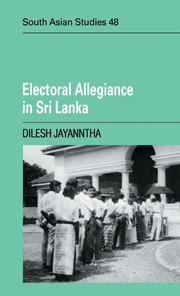Book contents
- Frontmatter
- Contents
- Acknowledgments
- List of abbreviations
- 1 Introduction
- 2 Bluville: the constituency and the patronage network of Doctor Ay (1947–1959)
- 3 Bluville: the patronage network of Korale-Mudaliyar Kit Foo and his son, Dee (1947–1959)
- 4 Bluville: the growth of the State (1956–1982)
- 5 Greenville: the patronage networks of the Mou/Nous and the Pou/Kous (1947–1959)
- 6 Greenville: the growth of the State (1956–1982)
- 7 Red Town: the urban setting (1947–1959)
- 8 Red Town: the growth of the State (1956–1982)
- 9 Communal minorities, political dissidents and the JVP
- 10 Conclusion
- Glossary of Sinhalese Terms
- References
- Index
- CAMBRIDGE SOUTH ASIAN STUDIES
- Frontmatter
- Contents
- Acknowledgments
- List of abbreviations
- 1 Introduction
- 2 Bluville: the constituency and the patronage network of Doctor Ay (1947–1959)
- 3 Bluville: the patronage network of Korale-Mudaliyar Kit Foo and his son, Dee (1947–1959)
- 4 Bluville: the growth of the State (1956–1982)
- 5 Greenville: the patronage networks of the Mou/Nous and the Pou/Kous (1947–1959)
- 6 Greenville: the growth of the State (1956–1982)
- 7 Red Town: the urban setting (1947–1959)
- 8 Red Town: the growth of the State (1956–1982)
- 9 Communal minorities, political dissidents and the JVP
- 10 Conclusion
- Glossary of Sinhalese Terms
- References
- Index
- CAMBRIDGE SOUTH ASIAN STUDIES
Summary
Caste, patronage and politics; the Pan-Indian background
It is tempting to study caste, patronage and politics in Sri Lanka in a Pan-Indian context. Certainly the country bears many similarities to her giant neighbour to the north. However, in several important respects a comparison has to be qualified. First, Sri Lanka is only a fraction of the size of India, and in terms of both area and population smaller than the average Indian state. This physical difference is compounded administratively, India being a federation of states many with their own particular identities, whilst Sri Lanka is a unitary nation. Thus any comparison of Sri Lanka should strictly be with a particular part of India rather than with the whole country. Secondly, even then it should be recognized that Sri Lanka, despite its geographical proximity to India, has had very different historical antecedents. The prevalence of Buddhism since the second century BC meant that the caste system was never so rigid and hierarchical as in most parts of Hindu India. Moreover, the Low Country was exposed to four-and-a-half centuries of Western influence in a way few Indian states were. This helped to undermine further what little caste hierarchy did exist in Sri Lanka.
However, the literature on India which is chiefly confined to particular provinces or districts does provide some sort of framework within which Sri Lankan politics can be studied. In particular there are several studies of patron–client relationships at the village and district levels. It has been shown that these form the basis for political allegiance.
- Type
- Chapter
- Information
- Electoral Allegiance in Sri Lanka , pp. 1 - 9Publisher: Cambridge University PressPrint publication year: 1992



